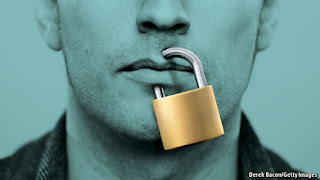What's Wrong with Human Rights?
As we all
know there has been much heated discussion about rights, and it has been
particularly fierce in the transgender battles. Much of the focus there has
been on men who have transitioned and their right to be treated as women. If
recognised, this right means they can, for example, compete in women’s sports
and occupy women’s safe spaces. However, in criticising aggressive transgenderism,
more often than not the wrong culprits are fingered and the reason the whole
thing has got out of hand is overlooked.
First, the
culprits. People have always said and demanded daft things, and the internet
has only exacerbated this phenomenon. But, traditionally, if a lobby group
demanded something the majority felt was outrageous, they would simply be
ignored. Or, if their demands were directed at government, told their request
had been taken under advisement and they would be informed of the outcome in
due course. The heart of the problem with the demands made by transgender activists
– and those of many other vocal rights groups − is not the fact that people
make these demands: it’s that they are listened to, and that policy is developed
and enforced accordingly. The culprits are our governing bodies.
The same
goes for the de-platforming of speakers with ‘divergent’ views at universities,
literary festivals and just plain paid-up speaking venues. One might expect an
outcry in social media and perhaps even on-the-street protests, but it is the authorities
who listen, who cave in to demands and who de-platform speakers that are
the culprits. If going ahead with an event creates a risk to public safety, then
arrest those threatening public safety. Don’t deny the right to free speech
under cover of preventing hate speech, with ‘hate speech’ defined as anything that
someone, somewhere, objects to. It seems obvious, but both sides in this fight are
utterly intransigent.
Why has this
happened? Why do our governing bodies listen to the rights-driven demands of
vocal lobby groups? It’s easy to accuse certain political and social classes –
not to mention certain media outlets – of being irretrievably woke, but why has
that happened? The question is complex, but one often-overlooked part of
the answer lies in the notion of rights as the basis of moral
decision-making and, by extension, legislation. If a group states that it has a
certain right and proclaims that this right must
be respected, our guardians simply don’t know what to do. They are lost. They
lack a moral compass.
Modern rights-based
thinking derives from the Universal Declaration of Human Rights, which was
proclaimed by the UN General Assembly in Paris on 10 December 1948. The
Declaration set out “for the first time, fundamental
human rights to be universally protected”, and it was hugely influential. The
EU is rights based, as is clear from its official website:
“The European Union is based on a strong commitment
to promoting and protecting human rights ... Human rights are at the heart of
EU relations with other countries and regions”. EU policy includes “promoting
the rights of women, children, minorities and displaced persons”.
Rights-based moral thinking was an understandable
reaction to the horrors of the Second World War, and the Declaration sprang
from noble intentions. But,
as with many good intentions, these have had perverse and unintended outcomes. A clue lies in that last sentence of the EU statement relating to minorities.
The original idea was that minority groups would be included in universal
human rights, “rights that
are inherent to all human beings, regardless of race, sex, nationality,
ethnicity, language, religion, or any other status”. The perverse outcome is
that any minority group whatsoever sees itself, by virtue of being a minority
group, as having special rights.
This presumption
of special rights results in the demand for special privileges, which is most
apparent in intersectionalist arguments. If I belong to a certain minority
group, I am allowed to use words that you are not allowed to use. I can call
you racist but I can never be racist. I can call you transphobic or
Islamophobic, but you can’t call me heterophobic or anti-Christian, because I
have special rights that make me untouchable. In fact I can pretty much do and
say whatever I want because I don’t have the same privileges as you, but the
group I belong to is disadvantaged, therefore I have unimpeachable rights.
The
presumption of special rights explains the culture of victimhood. It goes
without saying that individuals or groups can be, and are, the victims of terrible
wrongs, but one has to have been wronged
to be a victim. It is not sufficient to be a member of an identity group. That
said, it’s easy to see the appeal if membership of a group means being treated
in a special way. Who wouldn’t want to join up?
This is what
flummoxes our governing bodies. When considering these demands they can’t see
their way through the argument, because the idea of rights is so convincing and
yet inevitably leads to deadlock. A woman has a right to choose what happens to
her body, but a foetus has a right to life. Male-to-female transgenders have
the right to use women’s toilets, but women have the right to safe spaces. Individuals
have the right to free speech, but people have the right to be protected from
hate speech. Each right of each special group cancels out the opposing right, meaning
that no resolution is possible.
The only
option is to shout the loudest and heap the most abuse on one’s opponents, and
this is where social media come in. Ironically, the tactic often used is to
accuse one’s opponent of being in a certain group: “You’re just an old, white
male, so your views don’t count”. No matter how righteous and intersectional you
feel when tweeting this, it’s a tactic that involves assuming that certain
groups don’t have the same universal rights as others. Surely the danger is
obvious? It’s not so long ago that
“You’re just a young, black male so your views don’t count” seemed just as
incontrovertible.
The idea
behind universal human rights is to stop this historical flip-flopping of
who is currently persona non grata by rejecting special privileges for special
groups. Those framing the Universal Declaration of Human Rights in 1948
believed in the existence of “rights that are inherent to all human
beings, regardless of race, sex, nationality, ethnicity, language, religion, or
any other status”. They are truly universal, and they impose universal moral
responsibilities for how an individual should behave towards others, unlike special
rights, which encourage an obsession with how others should behave towards an
individual.
On Sunday 15 March Joe Biden announced
during the CNN Democrat debate, "If I'm elected president, my cabinet, my
administration, will look like the country. I commit that I will, in fact, pick
a woman to be my vice president." Fitness for the position, apparently, is
a secondary consideration. This doubtless wins Biden kudos from the left, but Christopher
Hitchens in a 2008 article says it best:
People
who think with their epidermis or their genitalia or their clan are the problem
to begin with. One does not banish this specter by invoking it. If I would not
vote against someone on the grounds of ‘race’ or ‘gender’ alone, then by the
exact same token I would not cast a vote in his or her favor for the identical
reason.
Hitchens died in 2011 and so missed the
worst of the latest obsession with identity politics, but it is worth looking
back at the arguments of this
combative writer. He pointed out
that Martin Luther King argued that colour is irrelevant, not that it is the
defining feature of a person’s identity. The current woke phrase “person of
colour” makes being or not being white the sole intersectional feature, and
while paving the way to weaponising the
phrase “white privilege” has the consequence of lumping together all other
races of the world, as if the Japanese businessman, the Inuit hunter and the Syrian
refugee mother actually share something meaningful in being non-white.
What our governing
bodies need is a decision-making tool that allows for moral debate rather than
cancellation. That tool can be found in the Universal Declaration of Human
Rights. The Declaration states that we all have the same rights, because
we all have the same moral obligations, and this idea needs to be kept foremost
in mind, and implemented. Special rights for special groups – even if apparently morally righteous
based on historical rebalancing and/or a retribution for past sins – are simply immoral in this light. ‘Positive
discrimination’ was always an unfortunate oxymoron, and it was well replaced by
‘affirmative action’, but action needs to be affirmatively directed at whoever needs
it as a suffering human being, not as a member of a special identity group.
This is not
a solution that ends all debates about competing rights. But it does provide a
framework for thinking about some of our most intractable social issues without
peremptorily shutting down one side of the argument.
David Wolcott




Comments
Post a Comment